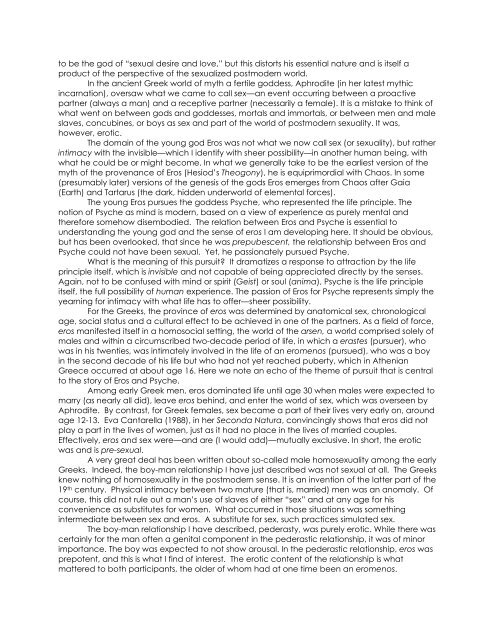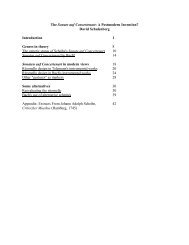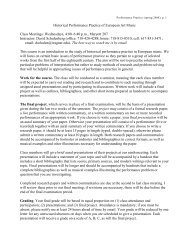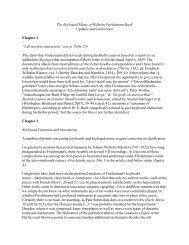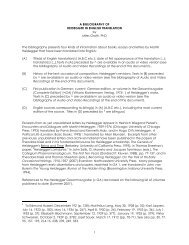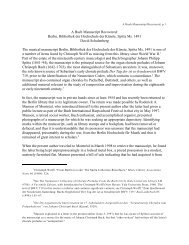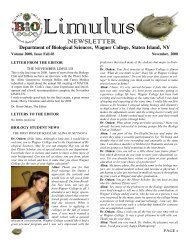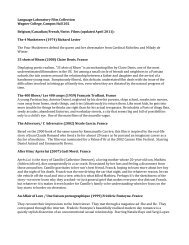SEVEN PAPERS ON EXISTENTIAL ANALYSIS ... - Wagner College
SEVEN PAPERS ON EXISTENTIAL ANALYSIS ... - Wagner College
SEVEN PAPERS ON EXISTENTIAL ANALYSIS ... - Wagner College
You also want an ePaper? Increase the reach of your titles
YUMPU automatically turns print PDFs into web optimized ePapers that Google loves.
to be the god of “sexual desire and love,” but this distorts his essential nature and is itself a<br />
product of the perspective of the sexualized postmodern world.<br />
In the ancient Greek world of myth a fertile goddess, Aphrodite (in her latest mythic<br />
incarnation), oversaw what we came to call sex—an event occurring between a proactive<br />
partner (always a man) and a receptive partner (necessarily a female). It is a mistake to think of<br />
what went on between gods and goddesses, mortals and immortals, or between men and male<br />
slaves, concubines, or boys as sex and part of the world of postmodern sexuality. It was,<br />
however, erotic.<br />
The domain of the young god Eros was not what we now call sex (or sexuality), but rather<br />
intimacy with the invisible—which I identify with sheer possibility—in another human being, with<br />
what he could be or might become. In what we generally take to be the earliest version of the<br />
myth of the provenance of Eros (Hesiod’s Theogony), he is equiprimordial with Chaos. In some<br />
(presumably later) versions of the genesis of the gods Eros emerges from Chaos after Gaia<br />
(Earth) and Tartarus (the dark, hidden underworld of elemental forces).<br />
The young Eros pursues the goddess Psyche, who represented the life principle. The<br />
notion of Psyche as mind is modern, based on a view of experience as purely mental and<br />
therefore somehow disembodied. The relation between Eros and Psyche is essential to<br />
understanding the young god and the sense of eros I am developing here. It should be obvious,<br />
but has been overlooked, that since he was prepubescent, the relationship between Eros and<br />
Psyche could not have been sexual. Yet, he passionately pursued Psyche.<br />
What is the meaning of this pursuit? It dramatizes a response to attraction by the life<br />
principle itself, which is invisible and not capable of being appreciated directly by the senses.<br />
Again, not to be confused with mind or spirit (Geist) or soul (anima), Psyche is the life principle<br />
itself, the full possibility of human experience. The passion of Eros for Psyche represents simply the<br />
yearning for intimacy with what life has to offer—sheer possibility.<br />
For the Greeks, the province of eros was determined by anatomical sex, chronological<br />
age, social status and a cultural effect to be achieved in one of the partners. As a field of force,<br />
eros manifested itself in a homosocial setting, the world of the arsen, a world comprised solely of<br />
males and within a circumscribed two-decade period of life, in which a erastes (pursuer), who<br />
was in his twenties, was intimately involved in the life of an eromenos (pursued), who was a boy<br />
in the second decade of his life but who had not yet reached puberty, which in Athenian<br />
Greece occurred at about age 16. Here we note an echo of the theme of pursuit that is central<br />
to the story of Eros and Psyche.<br />
Among early Greek men, eros dominated life until age 30 when males were expected to<br />
marry (as nearly all did), leave eros behind, and enter the world of sex, which was overseen by<br />
Aphrodite. By contrast, for Greek females, sex became a part of their lives very early on, around<br />
age 12-13. Eva Cantarella (1988), in her Seconda Natura, convincingly shows that eros did not<br />
play a part in the lives of women, just as it had no place in the lives of married couples.<br />
Effectively, eros and sex were—and are (I would add)—mutually exclusive. In short, the erotic<br />
was and is pre-sexual.<br />
A very great deal has been written about so-called male homosexuality among the early<br />
Greeks. Indeed, the boy-man relationship I have just described was not sexual at all. The Greeks<br />
knew nothing of homosexuality in the postmodern sense. It is an invention of the latter part of the<br />
19 th century. Physical intimacy between two mature (that is, married) men was an anomaly. Of<br />
course, this did not rule out a man’s use of slaves of either “sex” and at any age for his<br />
convenience as substitutes for women. What occurred in those situations was something<br />
intermediate between sex and eros. A substitute for sex, such practices simulated sex.<br />
The boy-man relationship I have described, pederasty, was purely erotic. While there was<br />
certainly for the man often a genital component in the pederastic relationship, it was of minor<br />
importance. The boy was expected to not show arousal. In the pederastic relationship, eros was<br />
prepotent, and this is what I find of interest. The erotic content of the relationship is what<br />
mattered to both participants, the older of whom had at one time been an eromenos.


